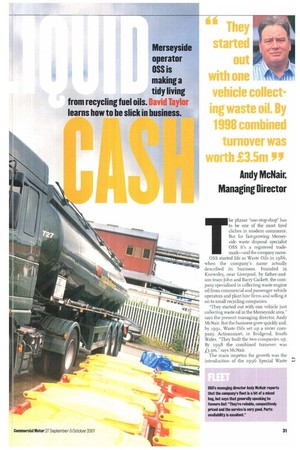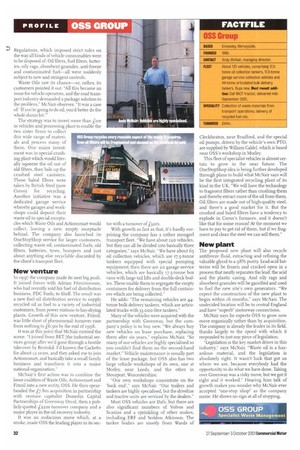T he phrase "one-stop-shop" has to be one of the most
Page 31

Page 32

If you've noticed an error in this article please click here to report it so we can fix it.
tired cliches in modern commerce. But for fast-growing Merseyside waste disposal specialist OSS it's a registered trademark—and the company name. OS S started life as Waste Oils in 1986, when the company's name actually described its business. Founded in Knowsley, near Liverpool, by father-andson team John and Barry Cackett, the company specialised in collecting waste engine oil from commercial and passenger vehicle operators and plant hire firrns and selling it on to small recycling companies.
They started out with one vehicle just collecting waste oil in the Merseyside area," says the present managing director, Andy McNair. But the business grew quickly and, by 1991, Waste Oils set up a sister company, Actionsmart, in Bridgend, South Wales. "They built the two companies up. By 1998 the combined turnover was f3.5m," says McNair.
The main impetus for growth was the introduction of the 1996 Special Waste
D Regulations, which imposed strict rules on the way all kinds of vehicle consumables were to be disposed of. Oil filters, fuel filters, batteries, oily rags, absorbent granules, anti-freeze and contaminated fuel—all were suddenly subject to new and stringent controls.
Waste Oils saw its chance—or, rather, its customers pointed it out. "All this became an issue for vehicle operators, and the road transport industry demanded a package solution to the problem," McNair observes. "It was a case of 'If you're going to do oil, you'd better do the whole damn lot.–
The strategy was to invest more than Lim in vehicles and processing plant to enable the two sister firms to collect this wide range of materials and process many of them. One major investment was in special crushing plant which would literally squeeze the oil out of old filters, then bale up the crushed steel canisters. These baled filters were taken by British Steel (now Com s) for recycling. Another initiative was a dedicated garage service whereby garages and workshops could deposit their waste oil in special receptacles which Waste Oils and Actionsmart would collect, leaving a new, empty receptacle behind. The company also launched its OneStopShop service for larger customers, collecting waste oil, contaminated fuels, old filters, batteries, tyres, bumpers and just about anything else recyclable discarded by the client's transport fleet.
New venture
In 1997 the company made its next big push. It joined forces with Adrian Fitzsimmons, who had recently sold his fuel oil distribution business, PDC Fuels, to Shell. The result was a new fuel oil distribution service to supply recycled oil as fuel to a variety of industrial customers, from power stations to hay-drying plants. Growth of this new venture, Fitzoil, was little short of phenomenal: turnover rose from nothing to i6.5m by the end of 19 98.
It was at this point that McNair entered the scene. "I joined from BET [the industrial services group] after we'd gone through a hostile take-over by Rentokil. I'd known the Cacketts for about 12 years, and they asked me to join Actionsmart, and basically take a small family business and transform it into a major national organisation."
McNair's first action was to combine the loose coalition of Waste Oils, Actionsmart and Fitzoil into a new entity, OSS. He then spearheaded the f7.8m acquisition in partnership with venture capitalist Dunedin Capital Partnerships of Greenway Orcol, then a publicly-quoted L22M turnover company and a major player in the oil recovery industry.
It was an audacious move which, at a stroke, made OSS the leading player in its sec tor with a turnover of i32m.
With growth as fast as that, it's hardly surprising the company has a rather mongrel transport fleet. "We have about rzo vehicles, but they can all be divided into basically thee categories," says McNair. "We have about 65 oil collection vehicles, which are 7.5-tonne tankers equipped with special pumping equipment; then there are zo garage service vehicles, which are basically I7.5-tonne box vans with large tail lifts and double-deck bodies. These enable them to segregate the empty containers for delivery from the full containers which are being collected."
He adds: "The remaining vehicles are 44tonne bulk delivery tankers, which are articulated trucks with 33, 000-litre tankers."
Many of the vehicles were acquired with the partnership with Greenway, but the company's policy is to buy new. "We always buy new vehicles on lease purchase, replacing them after six years," explains McNair. "So many of our vehicles are highly specialised so you couldn't find them on the second-hand market." Vehicle maintenance is usually part of the lease package, but 055 also has two large vehicle workshops of its own, one at Morley, near Leeds, and the other in Stourport, Worcestershire.
"Our own workshops concentrate on the 'back end'," says McNair. "Our trailers and tankers are highly specialised, but the driveline and tractive units are serviced by the dealers."
Most OSS vehicles are Dafs, but there are also significant numbers of Volvos and Scanias and a sprinkling of other makes, including ERE and Seddon Atkinson. The tanker bodies are mostly from Wards of Cleckheaton, near Bradford, and the special oil pumps, driven by the vehicle's own PTO, are supplied by William Caldel, which is based near 0 SS's workshop in Morley.
This fleet of specialist vehicles is almost certain to grow in the near future. The OneStopShop idea is being further developed through plans to build what McNair says will be the first integrated recycling plant of its kind in the UK. "We will have the technology to fragment filters rather than crushing them and thereby extract more of the oil from them. Oil filters are made out of high-quality steel, and there's a good market for it But the crushed and baled filters have a tendency to explode in Conis's furnaces, and it doesn't like that for some reason! At the moment we have to pay to get rid of them, but if we fragment and clean the steel we can sell them."
New plant
The proposed new plant will also recycle antifreeze fluid, extracting and refining the valuable glycol to a 98% purity. Lead-acid batteries will be frozen and cracked open in a process that neatly separates the lead, the acid and the plastic casing. And oily rags and absorbent granules will be gassified and used to fuel the new site's own generators. "We expect the construction of the new plant to begin within 16 months," says McNair. The undecided location will be in central England and have "superb" motorway connections.
McNair says he expects 055 to grow now more organically rather than by acquisition. The company is already the leader in its field, thanks largely to the speed with which it responded to just one piece of legislation.
"Legislation is the key market driver in this industry," says McNair. "Waste oil is a hazardous material, and the legislation is absolutely right. It wasn't luck that got us where we are, because everybody had the opportunity to do what we have done. Taking over Greenway was a risky move, but we got it right and it worked." Hearing him talk of growth makes you wonder why McNair ever accepted "one-stop shop" as the company name. He shows no sign at all of stopping.




































































































































